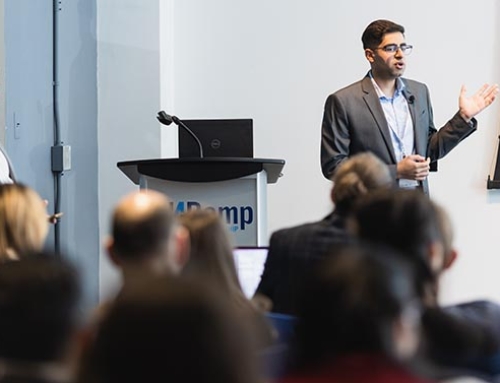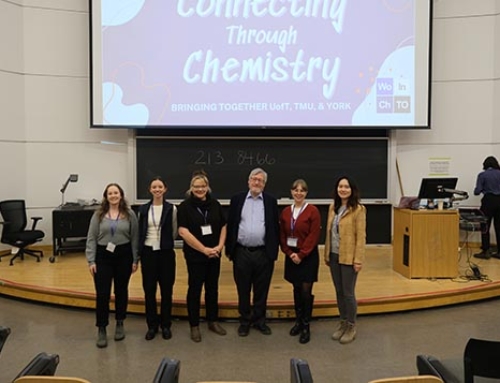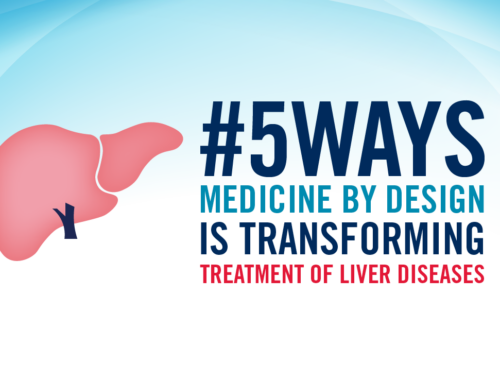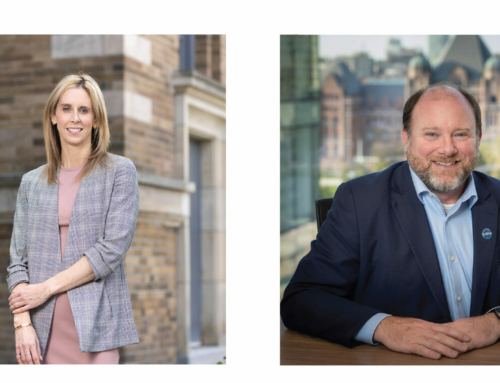
Trainees at a past Summer by Design session. (Photo by Neil Ta)
Building a Biotech Venture, a trainee entrepreneurship program, is going into its second year with expanded education and support for trainees who are thinking about taking their first steps toward building their research into a product or venture.
On Thursday, Nov. 4, interested trainees are invited to join an information session to learn more about the 2021-2022 program, and how they can apply.
Last year, more than 18 teams, made up of three to five members, were accepted into the program, which provided entrepreneurial education and mentorship to support teams in thinking about their science in terms of a product or venture and developing presentation and storytelling skills.
“At the end of last year’s program, six of the participating venture team were selected to participate in a pitch competition, where the first-place team received $25,000 to advance their concept through the execution of pivotal or proof of concept experiments,” says Allison Brown, director, strategy & translation, at Medicine by Design.
“Participating in the Building a Biotech Venture program facilitated a rapid exposure for us, enabling us to attract the attention of multiple stakeholders. The research funding provided by Medicine by Design allowed us conduct pivotal experiments that have advanced our technology, which is now attracting investment opportunities. We are now ready to join CDL’s Neuro stream to connect with mentors who have renowned expertise that can further accelerate our venture to the next milestones.”
Tobi Olaoye, PhD candidate from the lab of Patrick T. Gunning, and member of the HDAX Therapeutics team, which received $25,00 in research funding after last year’s pitch competition
“This year, we’re enhancing the program with additional partners; more workshops on topics like intellectual property, clinical translation and early-stage investment; enhanced presentation skills coaching; and more research funding, with an additional $10,000 being given to the second-place team at the pitch competition,” says Brown.
The program is open to trainees at labs at the University of Toronto or its affiliated hospitals who are doing regenerative medicine- or precision medicine-related research.
For the 2021-2022 program, Medicine by Design is collaborating with the Precision Medicine Initiative (PRiME), a U of T initiative that aligns research efforts in the area of precision medicine. This partnership broadens the reach of the program to engage additional trainees within the biomedical research community.
“We’re looking forward to joining Medicine by Design in offering this year’s Building a Biotech Venture program to the next-generation of researchers that will need a broad set of skills in their futures,” says Christine Misquitta, PRiME’s director of strategy & partnerships. “This unique, hands-on experience complements their scientific training as graduate students and post-doctoral fellows with practical business knowledge and commercialization skills that will help them get their science to a place where it can be applied to help people.”
The Health Innovation Hub (H2i), a campus-linked accelerator at the Temerty Faculty of Medicine, will anchor the program again this year, guiding teams through the early stages of venture development by providing educational workshops and mentoring opportunities. A third partner, Talk Boutique, will have an expanded role in providing storytelling and presentation skills workshops.
“All the partners have been working with each other to feature an important perspective on entrepreneurial skills that are in high demand within Toronto’s booming biotech ecosystem. This opportunity is for individuals who wish to start their own company and for those who want to work in the industry,” says Brown. “This program accelerates Medicine by Design’s strategic goal of bridging a critical gap between early-stage transformational research and company creation.”
Misquitta says the program’s focus on the earliest stages of venture creation makes this a great program for trainees who are interested in research translation. “H2i’s venture development program is a great fit for scientists just beginning to think about entrepreneurship, as well as those who are slightly further along in the process.”
Since its inception in 2013, H2i has supported over 250 companies from more than 15 faculties across all three U of T campuses, and now carries a portfolio of approximately 150 active companies that created more than $32 million in economic value in 2020-2021, and over $109 million since H2i began.
“Building a Biotech Venture is much more than a pitch competition,” says Paul Santerre, director of H2i and a professor at the Faculty of Dentistry and the Institute of Biomedical Engineering at U of T. “It’s a full skill-development program that will help participants think about their research in terms of a product or business, familiarize themselves with the fast-growing innovation economy and experience building a business case and delivering it to industry experts.”
Santerre says that the mentorship and presentation skills components of the program are important parts of ensuring participants receive a well-rounded knowledge base. “The teams will learn directly from mentors with first-hand experience as they develop their company’s vision and business concept, and they will also understand how to describe their science in a compelling way, a key skill when approaching potential investors or partners.”
He adds that trainees who have a great concept but haven’t formed a team are highly encouraged to attend the information session. “We are planning to follow up the initial information session with a team networking session that will allow trainees who don’t yet have a team, or need to add to their team, to connect with each other.”
One of the main goals of Building a Biotech Venture is to prepare the teams to be successful in more advanced incubators like the Creative Destruction Lab (CDL), a Medicine by Design partner, and to be ready to participate in CDL’s Health Stream which will connect them with investors and venture funding opportunities
HDAX Therapeutics, the team chosen by the judges to receive $25,000 of research funding at last year’s pitch competition, have been accepted into CDL’s 2021 program.
“‘Participating in the Building a Biotech Venture program facilitated a rapid exposure for us, enabling us to attract the attention of multiple stakeholders. The research funding provided by Medicine by Design allowed us conduct pivotal experiments that have advanced our technology, which is now attracting investment opportunities,” Tobi Olaoye, chemical biologist and PhD candidate from the lab of Patrick T. Gunning, and member of the HDAX Therapeutics team, says.
“We are now ready to join CDLs Neuro stream to connect with mentors who have renowned expertise that can further accelerate our venture to the next milestones.”
Many of the additional teams who participated in lasts year’s program are still actively building those companies as members of H2i.
The information session on Nov. 4 will be the first step for trainees who would like to participate in the program. This session will give an overview of the program, and an introduction to some of the concepts in H2i’s program, including 10 key elements of H2i’s business canvas. It will also explain the process of forming a team, which Medicine by Design and PRiME will help to facilitate.
Teams will be able to apply to the join the full program after the November event. Priority will be given to new applicants and ventures that did not participate in the program last year. Teams that are selected will participate in educational workshops from January to April 2022. At the end of the program, a select number of teams will be chosen to participate in the pitch competition.
About Medicine by Design and regenerative medicine
Funded by a $114-million grant from the Canada First Research Excellence Fund, Medicine by Design brings together more than 150 principal investigators at the University of Toronto and its affiliated hospitals to advance regenerative medicine discoveries and accelerate them toward impact. It builds on decades of made-in-Canada excellence in regenerative medicine dating back to the discovery of stem cells in the early 1960s by Toronto researchers James Till and Dr. Ernest McCulloch.
Regenerative medicine uses stem cells to replace diseased tissues and organs, creating therapies in which cells are the biological product. Regenerative medicine can also mean triggering stem cells that are already present in the human body to repair damaged tissues or to modulate immune responses. Increasingly, regenerative medicine researchers are using a stem cell lens to identify critical interactions or defects that prepare the ground for disease, paving the way for new approaches to preventing disease before it starts.







